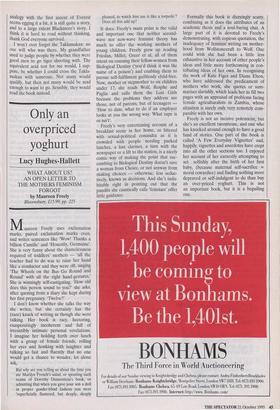Only an overpriced yoghurt
Lucy Hughes-Hallett
WHAT ABOUT US? AN OPEN LETTER TO THE MOTHERS FEMINISM FORGOT by Maureen Freely Bloomsbury, £15.99, pp. 225 Maureen Freely uses exclamation marks, paired exclamation marks even, and writes sentences like 'Wow! Thanks a billion Camille' and 'Honestly, Germaine'. She is very funny about the shamelessness required of toddlers' mothers — 'all the teacher had to do was to raise her hand like a conductor and they were off, singing `The Wheels on the Bus Go Round and Round' with all the right hand-gestures.' She is winningly self-castigating. 'How old does this person sound to you?' she asks, after quoting from a diary she kept during her first pregnancy. 'Twelve?'
I don't know whether she talks the way she writes, but she certainly has the (rare) knack of writing as though she were talking. Her book is racy, hectoring, exasperatingly incoherent and full of irresistibly intimate personal revelations. I imagine her holding forth over lunch with a group of female friends, rolling her eyes and honking with laughter and talking so fast and fluently that no one would get a chance to wonder, let alone ask, But why are you telling us about the time you ate Marilyn French's salad, or spouting such reams of Dorothy Dinnerstein's book, or admitting that when you gave your son a doll in proper gender-blind fashion you were `superficially flustered, but deeply, deeply
pleased, to watch him use it like a torpedo'? Does all this add up?
It does. Freely's main point is the valid and important one that neither second- wave nor new-wave feminist theory has much to offer the working mothers of young children. Freely grew up reading Friedan, Millet, Greer et al, all of them intent on rescuing their fellow-women from Biological Destiny (`you'd think it was the name of a poison') and enabling them to pursue self-fulfilment guiltlessly child-free. Now, mother or stepmother to six children under 17, she reads Wolf, Roiphe and Paglia and calls them the Lost Girls because the problems they address are those, not of parents, but of teenagers 'How to date, what to do if an employer looks at you the wrong way. What rape is or isn't'.
Freely's very entertaining account of a breakfast scene in her home, as littered with sexual-political conundra as it is crowded with people needing packed lunches, a lost clarinet, a turn with the newspaper or a lift to the station, is a nicely comic way of making the point that suc- cumbing to Biological Destiny doesn't save a woman from Choice, or not anyway from making choices — otherwise, less seduc- tively, known as decisions. And she's indu- bitably right in pointing out that the pundits she caustically calls lemstars' offer little guidance. Formally this book is dizzyingly scatty, combining as it does the attributes of an academic thesis and a soul-baring chat. A large part of it is devoted to Freely's demonstrating, with copious quotation, the inadequacy of feminist writing on mother- hood from Wollstonecraft to Wolf. One could wish she had been a little less exhaustive in her account of other people's ideas and little more forthcoming in con- tributing ideas of her own. In recognising the work of Kate Figes and Diane Elson, who have addressed the predicament of mothers who work, she quotes or sum- marises slavishly, which leads her to fill two pages with an appraisal of problems facing female agriculturalists in Zambia, whose situation is surely only very remotely com- parable with her own.
Freely is not an incisive polemicist, but she's an excellent raconteuse, and one who has knocked around enough to have a good fund of stories. One part of the book is called 'A Few Everyday Vignettes' and, happily, vignettes and anecdotes have crept into all the other sections too. I enjoyed her account of her earnestly attempting to act selfishly after the birth of her first baby, (because maternal self-sacrifice = moral cowardice) and finding nothing more depraved or self-indulgent to do than buy an over-priced yoghurt. This is not an important book, but it is a beguiling one.










































































 Previous page
Previous page